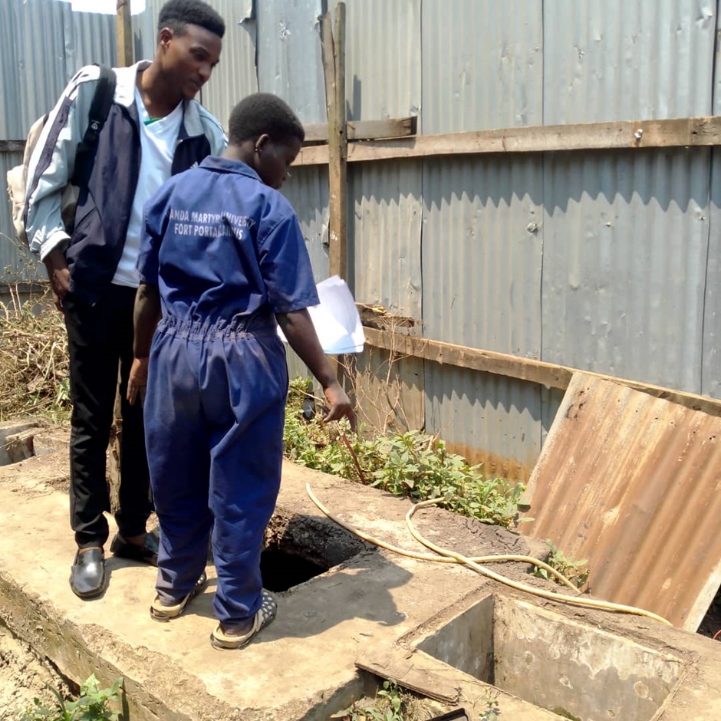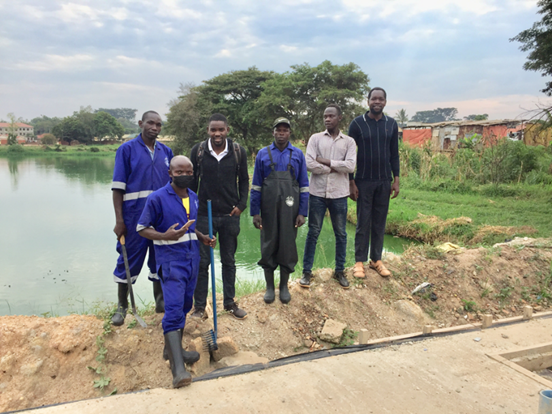March 2024 Personal Protective Equipment for Sanitation Workers at Fecal Sludge Management Plants in Uganda Bulafu Douglas
Two sanitation workers without all the necessary PPE required during the emptying of a blocked wastewater channel
March 2024 Personal Protective Equipment for Sanitation Workers at Fecal Sludge Management Plants in Uganda Bulafu Douglas
Part of the blog series 'Researchers for Sanitation Workers’ Rights' by UNC Sanitation Workers Research Awards 2023 awardees
Although sanitation workers provide a fundamental environmental health service to society, their occupation exposes them to extreme health and safety hazards including social discrimination and stigma. To provide support to sanitation workers, the Department of Disease Control and Environmental Health at Makerere University School of Public Health carried out a study to understand the awareness of occupational biological risks and the use of Personal Protective Equipment (PPE) by sanitation workers in fecal waste management plants in nine cities in Uganda (See map to situate Arua, Lira, Gulu, Mbale, Jinja, Masaka, Kampala, Fort Portal and Mbarara).
The research team used both quantitative and qualitative methods, reaching 417 sanitation workers with structured questionnaires (emptiers, sewer cleaners, and pumping station and plant operators) and conducting 17 key informant interviews with stakeholders such as the officials at the fecal sludge treatment plants, the National Water and Sewerage Corporation, the Public Health departments in the selected cities, and the Ministry of Health.

Sanitation workers reported being exposed to various occupational risks that could lead to injuries, illnesses, and death. These risks included exposure to faecal pathogens, strenuous labour, working in confined spaces, exposure to poisonous gases, and the use of hazardous chemicals. One of the officials shared the events of a fatal accident to highlight how dangerous the work is: “We had a case where two people died in a septic tank. They were trying to empty it and what killed them were the gases inside the septic tank which caused suffocation." Not only do these occupational risks impact the health of sanitation workers, they also have an impact on their financial security, and reduce the productivity, efficiency and effectiveness of the fecal sludge treatment plant.
The majority of sanitation workers interviewed (88%) were aware of the risks, adding that they were most at risk when collecting fecal sludge and at fecal sludge treatment plants, especially at the screening level. This was because activities at the screening point involved direct contact with raw sewage and potentially hazardous materials. Sanitation workers explained that during the screening process, they often encounter sharp objects, broken glass, and other debris mixed with fecal sludge, posing a significant threat to their safety. PPE, such as gloves, masks, waterproof boots, and overalls, is crucial to reduce occupational health risks. Although PPE should be provided to fecal sludge handlers, about 61% of sanitation workers reported they bought their own. Additionally, about of sanitation workers reported that they always wore the availed PPE when working. The sanitation workers that did not use PPE, told us that PPE was not provided to them (61%), and that PPE and expensive to buy (55%).

Christopher Tumusiime (left) a research assistant being shown by a sanitation worker some of the hazards when working around a septic tank.
Different factors influenced use of PPE by sanitation workers: 53% higher use by those who had PPE at their workplace; 32% higher use among workers who had knowledge about occupational health and safety guidelines; 25% higher use at treatment plants with occupational health and safety personnel; and 14% higher use in workplaces where wearing PPE was mandatory.
Based on this analysis, we identified several recommendations to improve the use of PPE.
- regularly provide PPE to their sanitation workers;
- provide refresher trainings on occupational hazards and safety;
- establish, review and strengthen their safety policies.
Study participants identified additional recommendations related to policy, awareness of regulation, and funding. Participants requested that policymakers and other stakeholders amend the present health and safety acts and regulations to make them easier to implement and enforce. A manager at one of the treatment plants stated, "The Public Health Act needs to urgently be updated because you can find that something about excreta management safety is not clearly specified hence very hard to implement." Participants also emphasized the need to create awareness of safety regulations for sanitation workers. One of the sanitation workers said, "There should be mass dissemination of these guidelines and the Act so that people know. Workers will be able to demand their rights if they are made aware." Lastly, some of the managers said there was inadequate financial support, and therefore a need to increase funding for occupational health and safety to effectively implement safety activities such as supervision and procurement of necessary equipment. "If there are more trainings for these people [sanitation workers], and there are more resources given to the provision of adequate PPE, I think we can do better," said a manager.

A group photo of sanitation workers dressed in overalls and research assistants at a lagoon in one of the study cities
Acknowledgements: This research study was conducted by a team of researchers from Makerere University School of Public Health led by Dr. David Musoke and Mr. Douglas Bulafu (Research Associate) from the Department of Disease Control and Environmental Health at Makerere University School of Public Health. This project was made possible through a research grant from the Initiative For Sanitation Workers.
